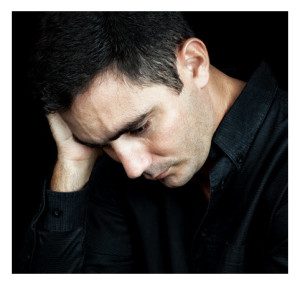When he threw out his back and didn’t recover in three days, he changed. Unused to physical constraints of any sort (much less chronic pain) – his mood soured, his comments cut, his interests turned inward. He grew depressed.
 His reading habits switched suddenly to the workings of the spinal column, the lower five vertebrae, the SI joint, ligaments, musculature, the proper way to sit and stand.
His reading habits switched suddenly to the workings of the spinal column, the lower five vertebrae, the SI joint, ligaments, musculature, the proper way to sit and stand.
This wasn’t the man I knew, and the transformation took less than a week as his discomfort persisted.
My partner struggled with pain that dogged him at various points in the day, subsiding somewhat in certain positions while propped on pillows and aided by anti-inflammatory meds.
I told him how fortunate he was that he had never been injured or laid up by illness, that he was off work at this time, and that he had good health insurance so he could visit a physician.
I reminded him he was in excellent shape generally, which it seemed to me, boded well. Still, he was unusually tired, preoccupied, and very blue.
Pain Alters Daily Life
As he also refused to see a doctor, my annoyance grew as I cared for him and simultaneously tried to work. Granted, many of us get the run-around when we seek medical care – I certainly have – referred from one office to the next, each time-consuming trip accompanied by a copay. But he was stubbornly insistent that his body would heal itself because if it didn’t, he couldn’t imagine his life waking in pain and going to sleep in pain.
Hearing that pissed me off. Sure, pain causes anger, anxiety, stress, enormous fatigue – especially when you are required to orchestrate the details of daily living around the way you sit or stand, where you sit or stand, how often you go out and where, how long you can tolerate a moving vehicle or a bus or for that matter, time away from a place where you can lie down to ease discomfort. These unexpressed, self-managed accommodations are routine for many.
Chronic pain impacts career, income, friendships, familial relationships, intimacy. Loving someone who suffers chronic pain isn’t a given, but it is a give-and-take that is manageable with thoughtfulness and communication.
Naturally, all of this is dependent on the type of pain we’re discussing, how it’s treated, its causes and individual circumstances. I certainly know what it is to wake in pain and go to sleep in pain each and every day. It is my “normal” as it is for millions of Americans, especially those who suffer from back pain and its ripple effects. You learn to manage because you must. And in case you’re wondering, the numbers are staggering: Various studies estimate 100+ million chronic pain sufferers, some 31 million suffering back pain, and:
Over a third of those in their mid-fifties and older have neck or back pain.
Relationships Run Amok
As for my partner, our discussions, once all about the world, about language, about a variety of topics, were suddenly all about the back – why streaks of pain were wrapping around the pelvis, what exercises could be undertaken and how quickly, why this happened when there seemed to be only a slight stretching one night that may have caused the problem.
Although I recognized that the newness of the situation (for him) made the anxiety all the more intense, my patience was quickly running out. The worst of his discomfort was over in a week, and while it continued to a lesser degree, the signs of depression trailed on as my partner realized the process of healing wouldn’t be immediate. He was forced to confront the ways in which pain compromises daily life. He was forced to consider what that might be like, for him. I hope he has a better understanding of my experience as a result.

About six weeks later, when significant healing was evident, then and only then did the crankiness, the morose moods, and the uncharacteristic self-absorption recede along with the pain.
During the period when I was dealing with his pain, I had a fresh look at the “other side” of this equation. I began to understand what it must be like for someone to love me on the “bad days.” That said, as this is old news in my life, I have developed coping mechanisms that he hasn’t, and hopefully will never have to understand firsthand.
Links Between Depression and Chronic Pain
The links between depression and chronic pain are well documented. Having experienced this phenomenon myself – discomfort in one arm and back due to injuries – I nonetheless have a framework for comparison that is an emotional lifesaver: the degree to which I am hurting is nothing compared to childbirth, and nothing compared to fibromyalgia (eradicated when a sleep disorder, Restless Leg Syndrome, was diagnosed and dealt with more than a decade ago).
 While RLS rears its ugly sleep-resistant head from time to time, generally it is easily managed. But I haven’t forgotten the years that came before, and the physicians to whom I described pain in joints and muscles running from my neck and collar bones down to my feet. I was routinely put through a few standard tests, deemed perfectly healthy, and lectured on lifestyle.
While RLS rears its ugly sleep-resistant head from time to time, generally it is easily managed. But I haven’t forgotten the years that came before, and the physicians to whom I described pain in joints and muscles running from my neck and collar bones down to my feet. I was routinely put through a few standard tests, deemed perfectly healthy, and lectured on lifestyle.
I was told “You’re an overwhelmed working mother; you’re just depressed.” Then I was offered the antidepressant du jour, and with increasing irritation I insisted “You would be depressed too if you were in pain every day.”
I had an eerily familiar round of physician visits a few years back, dismissed with similar responses, until one pragmatic gentleman determined that I had a vitamin deficiency, overlooked by all and simple to remedy. Those long months prior to that easy fix led me through a dark tunnel of pain and depression.
I do not wish to downplay the seriousness of clinical depression, with its persistent symptoms that include despair, worthlessness, and thoughts of suicide. Nor will I discount the role of life circumstances that may play their part – divorce, death of a loved one, job loss, illness, money problems. But when it comes to depression and chronic pain, I believe we are far too quick to jump on the former (and medicate for “happiness”) rather than to look at the latter and address the underlying cause.
Statistics and Resources on Pain and Depression
By no means do I wish to diminish the very real impacts of emotional distress on the physical body. I have been there as well, as have millions of us who fight the stigma of admitting to depression at various times in our lives. Without question, chronic pain and depression interact, and statistics paint a troubling picture:
According to the American Pain Foundation, about 32 million people in the U.S. report have had pain lasting longer than one year… From one-quarter to more than half of the population that complains of pain to their doctors are depressed.
Fortunately, there is greater awareness now than 20 years ago when I was neck-deep in a merry-go-round of non-answers. We are better informed, and understand that the physical symptoms associated with depression – headaches, body aches, sleeplessness and fatigue among them – are very real.
The Mayo Clinic offers wise words and options for addressing depression and pain that include:
Antidepressant medications [that] may relieve both pain and depression because of shared chemical messengers in the brain… talk therapy (counseling)… stress-reduction techniques, physical activity, exercise, meditation, journaling… pain rehabilitation programs…
Most importantly, we are reminded to seek assistance. And I would add – when depression arrives and sticks around beyond any reasonable measure, speak up. Do so without fear or stigma. It’s serious business, and help is available.
Please note: I am offering my experience, observations and opinions. If you are in pain or depressed, please consult a qualified physician, therapist or other medical professional.
You May Also Enjoy
I know too many friends and acquaintances who changed completely after they began to have chronic pain. I am not surprised at a link between the two.
Chronic pain is very wearing on the soul, and don’t I know it. Just a relatively short bout showed that in spades.
This is familiar.
As someone whose lived with increasingly bad chronic pain these past few years, I do very much believe there is a link between pain + depression.
The last doctor I saw sent me home with anti-depressants as well. Not what I needed, and I threw them away.
You don’t just snap out of it, either.
Learning to live with pain gracefully is an undertaking. You have to re-adjust, deepen your spiritual foundation, accept that it’s part of life, and that everything changes and nothing stays the same, including our bodies. All you can do is to keep working on healing. Take the best care of yourself that you can. Work to shift the negative thought patterns.
It’s NOT easy and such a process.
Wise words, Brigitte. “Gracefully” can be a challenge, but I agree that it helps – both the one in pain and those who live with him or her.
So glad you stopped by to read and comment.